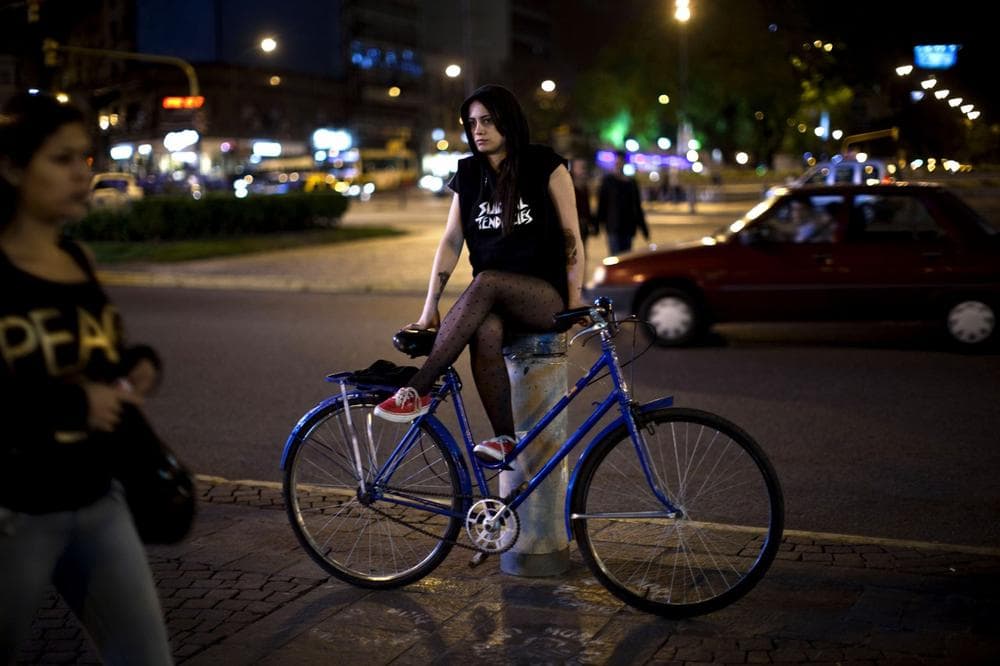Advertisement
Argentina Import Controls Put Brake On Bike Sales

Summer has arrived in the Southern Hemisphere, and bicyclists all over the Argentine capital have hit the streets to enjoy the warm weather. That means this should be peak season for bicycle manufacturers and shops all over town, but the ride hasn't been so smooth this year.
Instead, economic dysfunction has curtailed any possible boom. Cardboard boxes full of partially assembled mountain bikes, missing a pedal, seat or handlebars and unable to be sold, gather dust in a corner of the Musetta bicycle factory in suburban Buenos Aires. Meanwhile, they're running out of stock at Nodari Bikes, a neighborhood cycling store.
Civic leaders have tried to make Buenos Aires a bicycle-friendly city, but that's been stymied by another government initiative - protectionist import bans designed to spur domestic production that have instead strangled supplies of everything from bananas to prescription drugs.
Enacted by the national government on Feb. 1, the new laws block or restrict the importing of some 600 goods while requiring foreign companies to partner with local manufacturers. That's helped Argentina's domestic manufacturing capacity rebound, while unemployment has dropped and the nation's balance of trade has improved. But many products are also hard to find, pushing up prices and further heating up inflation.
For cyclists, fewer bikes are available because the business mostly relies on foreign-made parts.
"We're selling the little that remains and sort of waiting to see what happens next," said bike shop owner Claudio Nodari. "It's too bad because biking was growing - this was a moment of opportunity."
A record 1.8 million bicycles were sold in Argentina in 2011, and the industry had predicted sales would surpass 2 million bikes in 2012, producing an estimated $510 million in revenue.
Now, the Argentine Bicycle Chamber of Commerce and Industry estimates some 1.6 million bikes will be sold in 2012. And that number would have been lower but for a Buenos Aires city program that offered loans of up to $600 per bike purchase, the group says. In its first week, the financing program drew 4,000 requests at the 21 bike shops taking part.
If anything, Argentines have learned how to be creative, as President Cristina Fernandez imposes tight currency controls and other economic measures designed to fight high inflation and stop the flight of dollars.
Musetta owner Adrian Giuliani has had to call off plans to expand into producing high-end specialty and mountain bikes. Instead, the factory is making parts such as seat posts specifically hit by the import restrictions and also turning out simpler bikes.
"Instead of expanding to new models, we are producing many children's and cruiser bikes that don't require many imported parts. And business is steady," Giuliani said.
At manufacturer Bicicletas Enrique in the northwest Argentine city of Corboda, president Enrique Espanon says business will end the year down 15 percent from 2011. The manufacturer depends on foreign parts for much of its production.
Business leaders say the controls have forced companies of all types to come up with creative strategies just to keep going. Italian car maker Porsche, for example, is exporting Argentine wine, while BMW is exporting rice to meet a required balance in selling foreign- and domestically-produced goods.
Argentina's bike sector, however, wasn't prepared to export or otherwise meet local demand, which meant the price of bikes and bike parts has shot up and stock is dwindling, says the bicycle chamber's president, Claudio Canaglia.
At Nodari, a Mongoose bicycle that retails for $150 in the United States now costs the equivalent of $700 in Argentina.
Virtually all high-end bikes use imported parts, made mostly in Asia. When Nodari's shop can't find such foreign parts, it goes to local manufacturers, despite the inconsistent quantity and quality of their products, the store's owner said.
"I've had some trouble getting parts for my bike," says cyclist Diana June Tansey. "It took three stores to find a tube, and then I paid $20 for it, when they normally cost $5 to $10."
Hybrid bikes ridden by many for recreation also require a portion of imported parts, though not as many. Canaglia says that out of the 42 parts that make up a hybrid bike, just one or two may be imported, such as a chain, sprocket or handlebars. But without those parts, the bike is useless and unsellable, he says.
"Last year, imports represented just 11 percent of the industry," Canaglia said. "But that 11 percent is blocking our entire economy."
On the street, the restrictions mean more cyclists riding retro beach bikes with fat seats and wide handlebars, while those who want a higher-end ride suffer.
"It's like going from a Mercedes Benz to a 1970 Citroen," complained Nodari, the bicycle shop owner. "It's taking our business back to where it began."
Following a regional trend, Argentines have been increasingly giving up cars for bicycles, with the number of cyclists in Buenos Aires alone rising from 30,000 to 150,000 over the past three years, the city's government says. Bike sales surpassed used car sales in 2011.
Through its "Better on Bike" program, Buenos Aires has built almost 50 miles of bike lanes since 2009, and more than 30 miles are planned for next year.
"The world's biggest cities, such as Paris, New York, Barcelona and Bogota, have adopted the bicycle," said Sonia Fakiel, a spokeswoman for the city's transportation agency. "It's a strategic way to ease traffic and promote sustainability."
Most cyclists haven't let the restrictions stop them from riding, as the army of bikes on the city's streets this summer proves.
"For so long the people didn't have anywhere to ride their bikes," Nodari said. "But now, with all these bike lanes, they're bringing in grandpa's old bike and asking me to fix it up."
This program aired on December 23, 2012. The audio for this program is not available.